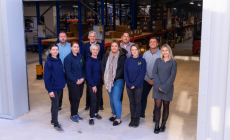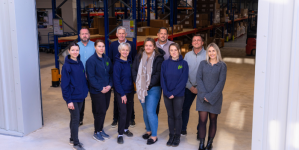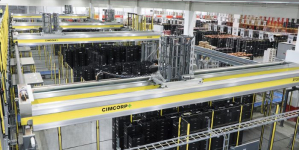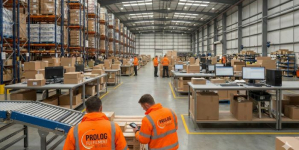-
Nulogy Introduces the Manufacturing Operating System - February 27, 2026
-
Bliss Direct scales to 300 daily orders and saves 25 hours per week with Forterro’s Orderwise ERP - February 25, 2026
-
Wootzwork raises $6.6M to bring predictability to offshore manufacturing - February 25, 2026
-
Rite-Hite unveils new range of hydraulic kits to upgrade and extend dock leveller performance - February 19, 2026
-
REWE and Cimcorp automate fresh supply chain for Berlin supermarkets and stores - February 19, 2026
-
Q1 – A recovery period or time to fix, switch and scale? - February 19, 2026
-
NULOGY’S SHOP FLOOR SOFTWARE TO POWER COMPLETE CO-PACKING’SOPERATIONS - February 13, 2026
-
Why lead generation depends upon good content - February 13, 2026
-
Wallapop and Albatross Sign Strategic Partnership to Bring Real-Time AI Discovery to the Future of Consumer-to-Consumer Commerce - February 12, 2026
-
Thorworld ramp helps Hubergroup to streamline its unloading operation - February 6, 2026
How global manufacturer Renold is investing in new WMS and ERP technology to boost the efficiency of its business
Renold plc is a global manufacturer of industrial chain, coupling and gearbox solutions. The group delivers high precision engineered and power transmission products to a wide range of markets, from cement making and chocolate manufacturing to subway trains and power stations, escalators and quarries. Renold is a public company with an annual turnover of £183.4 million*. The group employs over 2,100 people in 23 countries and has manufacturing sites worldwide including the USA, Germany, India, China, Malaysia and Australia. (*2017 annual report)
Renold is currently investing in new technology to drive greater efficiency and accuracy in its processes, replacing its former ERP (enterprise resource planning) systems and also introducing new WMS (warehouse management) systems, worldwide. “There is a great deal of raw material movement in our business and we need to know where our inventory is at any time” explains group business systems director Sarah Cobb, who is driving the change. “Clearly, inventory accuracy underpins any successful systems implementation of this kind: it boosts efficiency when you know exactly where the inventory is located that you need for a given operation. We have a very broad customer base, which is a good thing, but breadth and diversity demand good systems to underpin the business” Sarah Cobb adds.
For historic reasons Renold had a myriad of ERP systems across the group (and a fragmented systems history) but is now moving to a single ERP. It is currently rolling out the Infor M3 ERP system across more than 20 manufacturing, distribution and sales sites including America, South Africa, China, India, Germany and Australia, alongside TouchPath’s ‘TouchWMS’ system (www.touchpath.com/solutions/warehouse-management-systems-wms) which can be integrated with any ERP. “TouchWMS is a flexible, tried and tested system that does exactly what it says on the tin” Sarah Cobb observes. This is the group’s first foray into WMS, though Cobb does have previous personal experience of TouchWMS.
To date the WMS has been well received by Renold users including those in Cardiff, Germany and Switzerland (around 120 employees in total) where the tangible benefits of barcoding – the first WMS application to be implemented across the group – already seemed to have overcome any early user reservations. WMS implementation in India and China is planned for 2018 alongside M3 ERP. “In Germany our colleagues seem to particularly appreciate the time that barcoding saves them now that they can book in inventory on the spot, and also book their manufacturing orders as soon they are completed. They also like having an up to date picture of events” says Renold business systems implementation manager Craig Price.
Renold’s UK site in Cardiff is already live with both M3 ERP and TouchWMS. Its US site in Tennessee is also live; there the company currently uses SAP, but now integrated with TouchWMS.
A key benefit of Renold’s barcoding initiative using TouchWMS has been the ability to record operational booking within the manufacturing process, in real time. Going forward it will allow planners to know immediately where product is, and help them to understand schedule adherence, establish completion dates and direct labour resources. The system also allows the booking of production set-up and process times, allowing efficiency to be measured and improving costing accuracy through variance analysis. Also, the elimination of progress card collection and booking is labour-saving and more environmentally friendly.
The previous use of paper-based systems meant that stock movements were updated on the ERP system sometime after they had taken place, which led to product location and booking inaccuracies.
“The use of barcoding now gives us real time updates showing the product and location used” Sarah Cobb says. “Over the course of the year this will save us the significant amounts of time that we used to spend investigating inventory levels that were not up to date or were inaccurate. Real time stock updates also allow PI (perpetual inventory management) to take place throughout the day in the knowledge that what is being counted is ‘as is’, not out of date.
“Keeping track of goods arriving at a site can cause problems when the paperwork and the goods are parted. The use of WMS-driven barcoding now allows us to process the receipt without moving away from the goods, as with mobile printing GRNs (goods received notes) and product labels can be produced next to the goods. This ensures a high level of accuracy. When the goods are ready to be located the GRN can be quickly and easily scanned for identification and put-away” Sarah Cobb adds.
Sarah Cobb concludes: “Before, there were odd pockets of barcoding for particular processes but no company-wide system that was properly integrated with ERP. Over time, the role of WMS in Renold will grow, but our first WMS step, all-sites barcoding for all inventory movements is already having a marked and measurable impact on the business”.

































